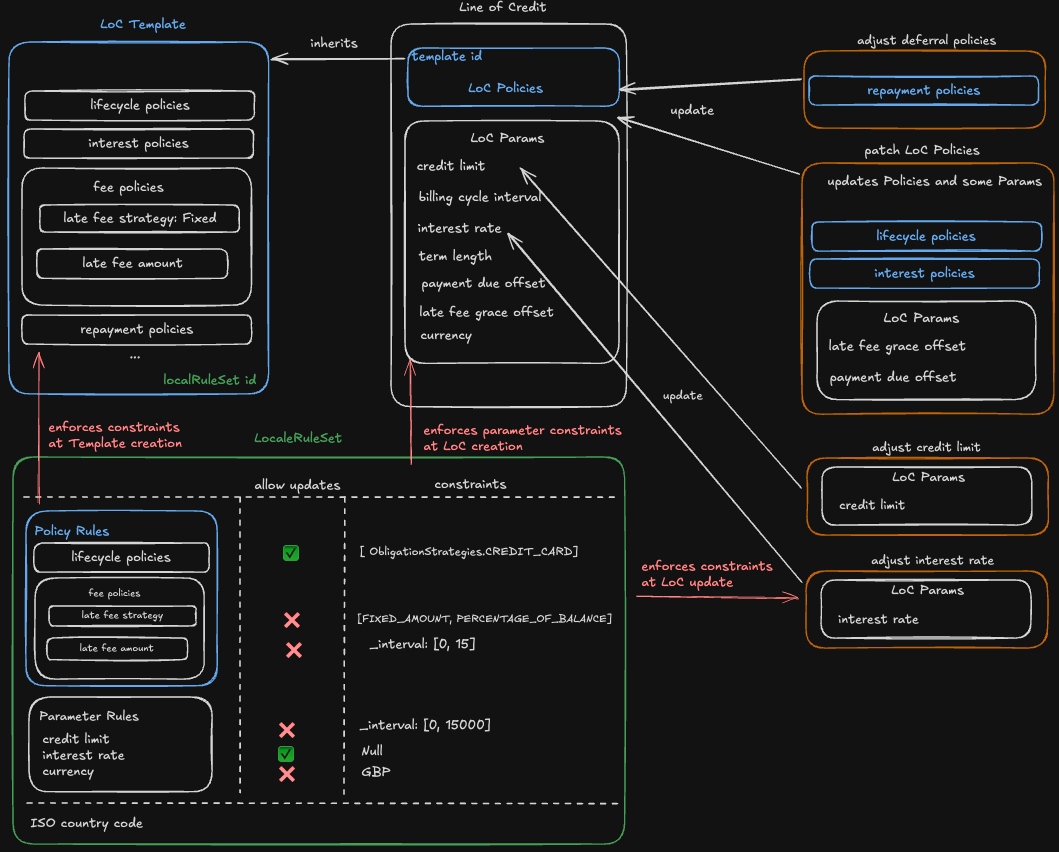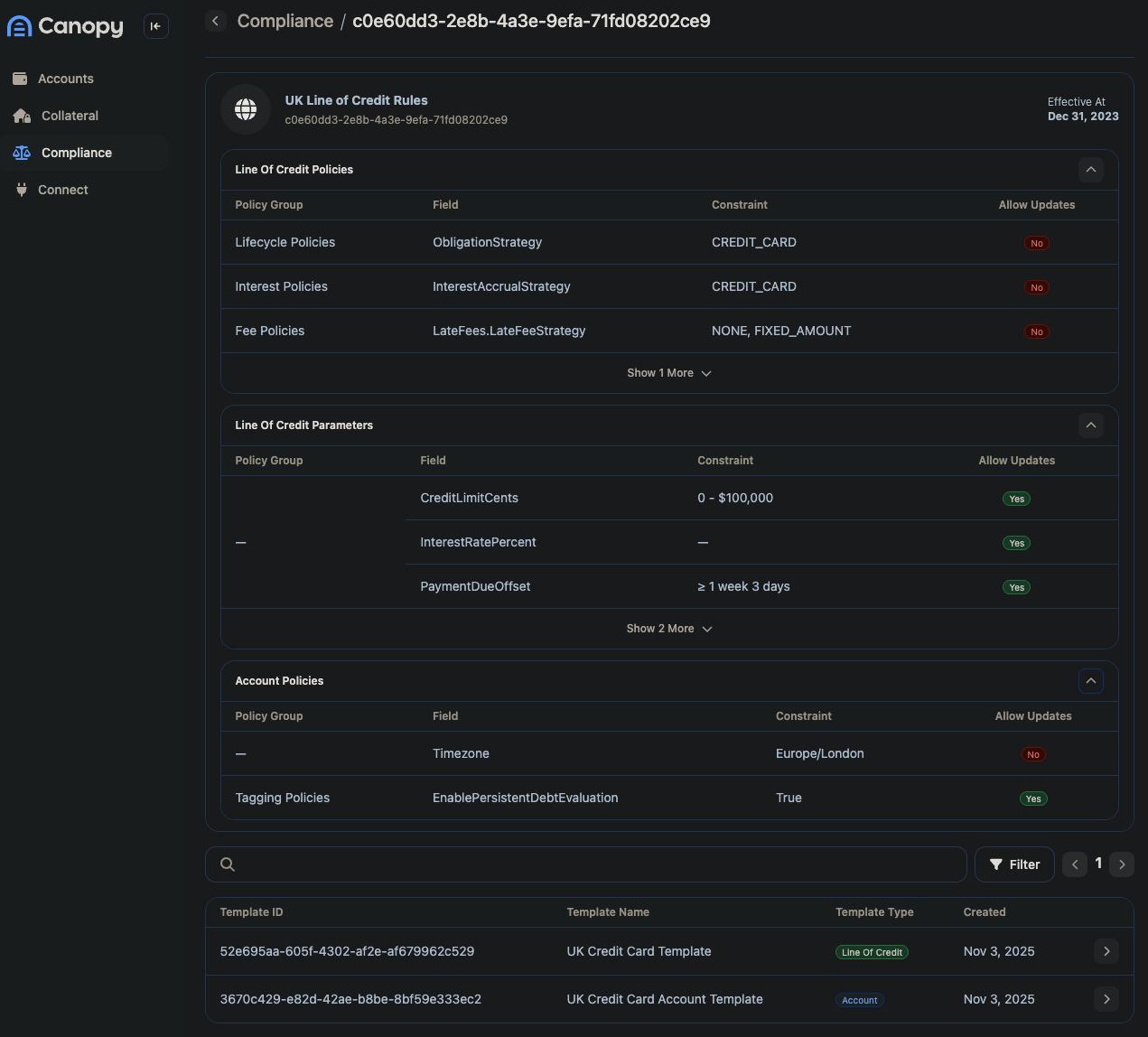Locale Rule Sets
Establishes the regulatory boundaries within which your lending program operates. These rules are non-negotiable constraints based on jurisdictional requirements.

Overview
Locale Rule Sets enable jurisdiction-specific compliance controls that automatically enforce regulatory requirements across your lending program. By associating rules with specific countries or jurisdictions using ISO 3166 country codes, Canopy's policy engine ensures that all product templates, account configurations, and transaction policies comply with local lending regulations without requiring manual oversight at the point of origination or servicing.
These rules integrate seamlessly with Canopy's template and policy system, providing guardrails that prevent non-compliant configurations while giving you flexibility to operate across multiple markets with different regulatory frameworks.
Key Capabilities
Jurisdiction-Specific Enforcement: Associate compliance rules with specific countries or jurisdictions using standardized ISO 3166 country codes, enabling precise regulatory control for multi-market lending programs.
Policy Engine Integration: Locale rules are automatically evaluated by Canopy's policy engine across all credit constructs—accounts, loans, lines of credit, advances, and transactions—ensuring consistent compliance enforcement throughout your platform.
Template-Level Controls: When configuring product templates and policies, locale rule sets automatically restrict available options to only those permitted in the target jurisdiction, preventing non-compliant configurations before they're deployed.
Multi-Layer Validation: Rules apply across all levels of your lending program, from high-level account policies down to individual transaction processing, creating comprehensive compliance coverage.
Use Cases
Multi-State Consumer Lending: A US-based lender operating across multiple states needs to comply with varying usury laws and fee caps. By configuring locale rule sets for each state (using ISO 3166-2 subdivision codes), the platform automatically enforces California's 36% APR cap on consumer loans while allowing higher rates in states without such restrictions. When a loan officer attempts to create a product template for California residents, the system only presents compliant rate and fee options.
International Expansion: A fintech company expanding from the US to Canada and Mexico configures locale rule sets for each country's regulatory framework. The Canadian rule set restricts advances to specific provinces where they're permitted, enforces federal criminal interest rate limits (47% APR), and requires French-language disclosures in Quebec. When originating a loan for a Canadian borrower, the system automatically applies CAD currency, appropriate timezone settings, and compliant obligation strategies—eliminating the risk of inadvertently violating cross-border lending regulations.
Configuration & Structure

ISO 3166 Country Codes
Locale Rule Sets use ISO 3166-1 alpha-2 country codes (e.g., "US", "CA", "MX") to identify countries, and ISO 3166-2 subdivision codes (e.g., "CA-ON" for Ontario, "US-CA" for California) for state, province, or regional jurisdiction targeting.
This standardized approach ensures precision when operating across jurisdictions with different regulatory requirements, even within the same country.
Rule Types & Enforcement
Some examples of the types of rules and enforcement Canopy provides:
| Rules and Enforcement | Examples | |
|---|---|---|
| Interest Rate Constraints | Locale rules can enforce maximum and minimum interest rates, specify required calculation methodologies (actuarial vs. simple interest), and restrict compounding frequencies to ensure compliance with usury laws and consumer protection regulations. | A rule set for Arkansas enforces the state's constitutional 17% maximum interest rate on consumer loans, automatically preventing product templates from configuring higher rates. |
| Fee Restrictions | Fee-related rules control maximum amounts or percentages for origination fees, late payment fees, NSF fees, and other charges. Rules can also prohibit specific fee types entirely in jurisdictions where they're not permitted. | A Colorado rule set prohibits maintenance fees on lines of credit and caps late fees at $25, aligning with state consumer credit regulations. |
| Currency & Timezone Settings | Locale rules specify permitted currencies and timezones for credit products in a jurisdiction, ensuring that loans are originated and serviced in appropriate monetary units and that payment schedules align with local banking days. | A Mexico rule set restricts currency to MXN and timezone to "America/Mexico_City", preventing accidental USD denominations or incorrect payment due dates. |
| Obligation Strategy Restrictions | Some jurisdictions limit how loan obligations can be structured. Locale rules can restrict available obligation strategies to only those permitted by local regulations. | A rule set for a jurisdiction with restrictions on interest-only periods might limit the obligation strategy policy to PRINCIPAL_AND_INTEREST only, preventing the configuration of interest-only payment periods that would violate local consumer lending laws. |
Template & Policy Integration
Template Configuration
When creating or modifying product templates, Canopy automatically applies the relevant locale rule set based on the target jurisdiction. The system presents only compliant configuration options and validates all settings against locale rules before saving.
If a template configuration violates a locale rule, the system returns a validation error identifying the specific constraint and the permitted range or options.

Policy Enforcement
Locale rules are evaluated in real-time during:
- Template creation and updates: Ensuring configurations meet jurisdictional requirements
- Account origination: Validating that account-level settings comply with the borrower's jurisdiction
- Credit construct origination: Confirming loan, line, or advance terms adhere to local regulations
- Transaction processing: Verifying that fees, charges, and payment allocations respect jurisdictional constraints
Multi-Jurisdiction Accounts
For lending programs operating across multiple jurisdictions, accounts can be associated with specific locale rule sets at origination based on the borrower's location or the governing law specified in the credit agreement.
This enables a single Canopy instance to enforce different regulatory frameworks for different borrower populations without requiring separate environments or manual compliance tracking.
Compliance Benefits
- Automated Regulatory Adherence: Locale Rule Sets eliminate manual compliance checks by automatically enforcing regulatory constraints at every configuration and origination point, reducing the risk of inadvertent violations.
- Audit Trail & Documentation: Every locale rule evaluation is logged, creating a comprehensive audit trail demonstrating compliance efforts and providing documentation for regulatory examinations.
- Reduced Compliance Risk: By preventing non-compliant configurations at the source, locale rules minimize exposure to regulatory penalties, consumer complaints, and reputational risk associated with lending violations.
- Scalable Multi-Market Operations: Lenders can confidently expand into new jurisdictions knowing that regulatory requirements are systematically enforced across the platform, without requiring specialized compliance knowledge for every team member.
Implementation Considerations
Rule Set Maintenance
Locale Rule Sets should be reviewed and updated as regulatory requirements change. Establish a process for monitoring regulatory updates in your operating jurisdictions and adjusting rule sets accordingly.
When rules are updated, existing credit products originated under previous rules are typically grandfathered unless explicitly modified, but new originations immediately reflect updated constraints.
Testing & Validation
Before deploying new locale rule sets or updates, thoroughly test template configurations and origination flows in your sandbox environment to ensure rules enforce intended constraints without over-restricting legitimate product offerings.
Regional Expertise
While locale rule sets automate enforcement, establishing them requires deep knowledge of jurisdictional lending regulations. Work with compliance counsel or regulatory experts when defining rules for new markets to ensure accuracy and completeness.
Updated 3 months ago